New Books
[by Mark Safranski, a.k.a. “zen“]
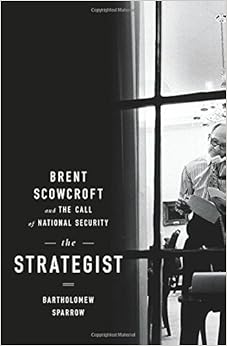
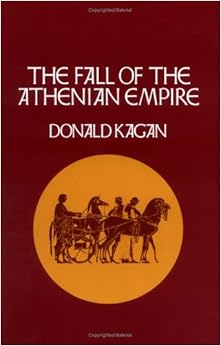
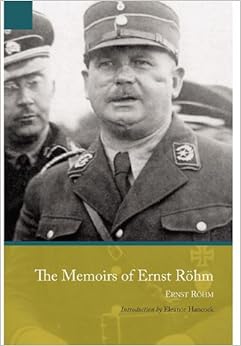
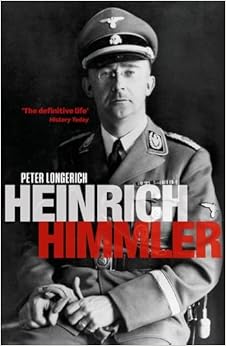
The Strategist: Brent Scowcroft ad the Call of National Security by Bartholomew Sparrow
The Fall of the Athenian Empire by Donald Kagan
The Memoirs of Ernst Rohm by Ernst Rohm
Heinrich Himmler by Peter Longerich
The Origins of the Final Solution by Christopher Browning
The Hitler Book: The Secret Dossier Prepared for Stalin by Henrik Eberle
Some new books….
The bio of Brent Scowcroft, if my impressions from picking up and opening to two random sections are valid, is going to be very. very good (they were on Scowcroft’s estimation of the working relationship of Henry Kissinger and Richard Nixon and Scowcroft’s strategic adice to the first President Bush during German reunification). I was very impressed both with Sparrow’s prose and his ability to let Scowcroft’s voice shine through the text.
I’m a fan of the pessimistic Donald Kagan and recommend his Yale Open Courseware series on Ancient Greece from time to time to my own students who show an interest in the Classical world. One of Kagan’s students, now an academic nautical archaeologist, John R. Hale, also produced a fine history of the Athenian navy and the intertwining of thalassocracy, empire and the Radical Democracy and I recommend that book to my students as well.
The next three books are related. Last year I read the frequently useful, but also at times turgidly tedious, I Knew Hitler, by Kurt G. W. Ludecke. The cause of Ludecke’s downfall with his semi-friend Adolf Hitler was the former’s constant embrace and enthusiastic promotion of the populist roughneck, leftist and “idealist” figures in the Nazi Party, like Ernst Rohm, the Strasser brothers and Alfred Rosenberg and Ludecke’s belief that the “movement” came before the Fuhrer. Ludecke dedicated his massive memoir to the memory of Rohm, who was the catalyst between the old Freikorps paramilitarism of the old German nationalist Right and its hideous and radicalized offspring, National Socialism. Rohm is a key figure in the development of Nazism and a complicated one, being one of the few early Nazi leaders to have been on familiar (“Du”) terms with Adolf Hitler and his sudden fall had wider implications than were realized at the time – including inspiring Stalin to reshape Soviet society with terror and murder (“Hitler, he shows us how to deal with political opponents!”). Rohm’s memoir has been partially translated into English and deals with the early years when the Nazis were but one extremist party in an ecosystem of radical right German politics.
Peter Longerich is one of the top German experts on the Holocaust and it is fitting that he has completed a monumental biography of Rohm’s former deputy, Heinrich Himmler, Reichsfuhrer-SS and the chief implementer of the Holocaust of European Jewry. Chris Browning, another expert on the Holocaust also has much to say on the role of Himmler and competing Nazi functionaries in the evolution of genocide as a state policy of the Third Reich. Finally, The Hitler Book was an NKVD/MGB top secret analysis put together by Soviet intelligence for Josef Stalin, mirroring, to a small extent, the OSS psychological profiling of Hitler and top Nazi leaders during the war.
Recently, T. Greer of Scholar’s Stage blog asked me how many of the strategy related books on my shelves had been read vs. being in the antilibrary. The answer was “most”. My antilibrary tends toward history and biography where I buy books more quickly than I can read them, while more instrumental books are bought and read shortly thereafter. I also trend toward “collecting” in Soviet studies, classical antiquity, Second and Third Reich Germany, US diplomatic history and books related to the Nixon administration.
What are you reading and buying these days?
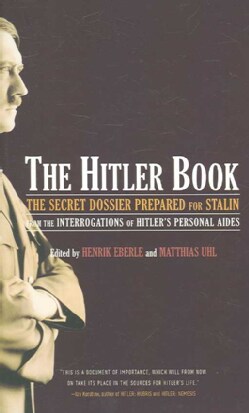



April 4th, 2015 at 6:38 am
” I also trend toward “collecting” in Soviet studies, classical antiquity, Second and Third Reich Germany, US diplomatic history and books related to the Nixon administration.”
Is there a particular reason that (or was there a particular time when) that led you to be interested in each of these categories?
(I Suppose my own list would go something like: classical Chinese history and philosophy, ancient Rome, nomadic or pastoral peoples and empires, medieval, especially Sengoku era, Japan, antebellum USA, and of course, the East Asian strategic tradition).
April 4th, 2015 at 2:02 pm
Paul Johnson, in his book Modern Times, claims that Hitler’s destruction of the SA inspired Stalin’s much larger purge. But Johnson provided no citation for this claim. It seems obvious, and it is certainly plausible. You apparently have seen a source for an actual quote from Stalin himself. Do you recall where you saw that quote? Rohm is an interesting figure. Is more populist version of National Socialism and his hostility to the Reichswehr give hints of a very different path not taken by Germany. It would probably I have been violent and aggressive, but it would’ve been inept about it, which would’ve been all to the good.
April 4th, 2015 at 8:03 pm
Hi Zen – I’d like to finally ask for a clarification about that exotic term “antilibrary”. It has long puzzled me, since “anti-” normally means “against” or “opposed to”. But then I saw where the term comes from an Italian writer. Which reminded me of my past puzzlement about the dining term “antipasto” — and later learning that “anti-” in Italian means “before” and not “against”. So I now presume that “antilibrary” refers to books that have accumulated before they belong in the library, not that somehow they stand in opposition to it. Yes? And if so, then wouldn’t a more accurate translation of the term into English be “ante-library”? Perhaps you or others have dealt with this question before somewhere; but if so, I can’t find where. — Curiously, David
April 4th, 2015 at 8:27 pm
Hi Gents!
.
in reverse order….
.
David – “antilibrary” was coined by Nassim Nicholas Taleb in The Black Swan and it gained currency in the blogosphere, starting here and at a now defunct blogger named “Munzenberg” (after the Comintern agent) – here is the Taleb quote:
.
“The writer Umberto Eco belongs to that small class of scholars who are encyclopedic, insightful, and nondull. he is the owner of a large personal library ( containing thirty thousand books), and separates vistors into two categories: those who react with ‘Wow! Signore professore dottore Eco, what a library you have! How many of these books have you read?’ and others – a very small minority- who get the point that a private library is not an ego boosting appendage but a research tool. Read books are far less valuable than unread ones. The library should contain as much of what you do not know as your financial means, mortgage rates, and the currently tight real estate market allow you to put there. You wil accumulate more knowledge and more books as you grow older, and the growig number of unread books on the shelves will look at you menacingly. Indeed, the more you know, the larger the rows of unread books. Let us call the collection of unread books an antilibrary.”
.
There were many posts by different bloggers in the strategy blogosphere on this topic circa 2008-2010 which then trailed off. I still like the term.
.
Lexington Green – there are numerous sources of this statement, which all seem to be paraphrases of what Stalin said. One of Stalin’s translators, who ended up doing A&E Biography and History Channel interviews gave the longest version “That Hitler, what a guy! He teaches us how to deal with political opponents” but I have seen several shorter and slightly different versions in print. I will dig a few up as the books are on my shelf.
.
Tanner – Yes! Nixon was a product of my first MA thesis which was on US-Romanian relations during the Nixon administration. The Third Reich and USSR interests originated in middle and high school and the classical eras during undergrad, though not from any classes, just in my spare time.
April 8th, 2015 at 12:43 am
I think instead of “Antilibrary”, he should have called it the “Antelibrary”, carrying the same type of meaning as the antechamber, as in the “Antechamber of Hope” Bastiani Fortress in chapter 7
April 8th, 2015 at 3:31 am
I wonder if it was an editorial error? Taleb is multilingual, if I recall, and his editor probably was not
April 8th, 2015 at 2:44 pm
I don’t think so. The book went through a second edition and a digital edition since he wrote it, so I would think it would have been corrected. I think he’s just being literal here, and that the antilibrary is just that – the unread collection that is opposite of a library of read books. He assigns such a high value to this unread collection because it’s a constant reminder of how little we still don’t know, which is a condition that figures highly in considerations of probability and survival.
.
While that’s a good enough point as it is, I think the unread collection has another deeper purpose. As Scott mentioned in his other post, when suddenly faced with a challenging subject and it hits us that this particular subject happens to be critically important, we dive in head first and whole hog buying books after books, scouring websites for PDFs, digging up old monographs, etc. accumulating more than we can probably read – the “cathartic simplicity of single purpose” – the isolation and estrangement eased by the fortress of those books and our “school” of study.